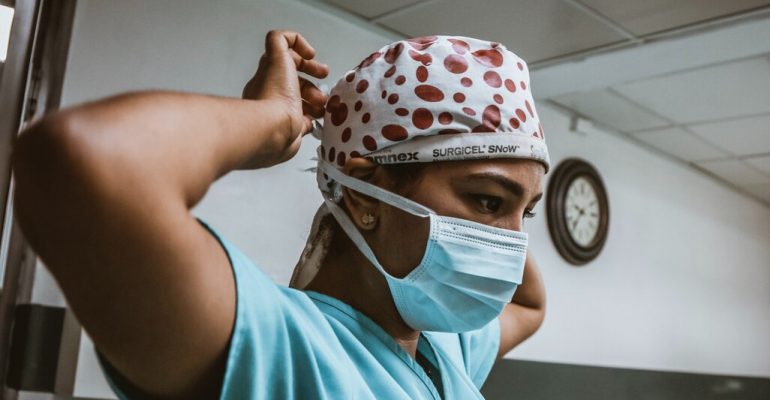Doctors in training: canaries in the covid-19 coalmine, or leaders of change?
October 26, 2020 2020-10-26 17:31Doctors in training: canaries in the covid-19 coalmine, or leaders of change?
The experience of covid-19 for doctors in training across the world is one of disruption. For those in countries with a high incidence of covid-19 cases, work has been realigned, and in some instances, every doctor has been redeployed as a covid-19 doctor. Specialties have temporarily ceased to have relevance, and not only has work been disrupted, training has been radically altered. In other countries, where due to a combination of good governance and good fortune, there have been relatively low numbers of covid-19 patients, work has still been significantly disrupted, with a realignment of services to create capacity for a potential surge of covid-19 patients. In some communities, this surge has mercifully not eventuated, but this, in turn, has led to a period of suspended animation, with reduced patient numbers, decreased training opportunities, and a loss of professional identity.
There is a generation of training doctors who are mourning the loss of a year that could have been, and adjusting to a “new normal;” with disturbances to their lives, both personal and professional, ranging from disruption of selection processes and exams, delays and interruptions to career progression, to loss of life from this novel virus. For those who survive this pandemic, there will also be a psychological impact, including moral injury. Psychological injury is “influenced by the way [staff] are supported before, during, and after a challenging incident”, and as personal protective equipment (PPE), and health services more broadly, have not always been adequate to protect health professionals and patients alike, this will worsen the toll of covid-19 on this cohort. [1] The mental health impact of this pandemic more broadly should not be underestimated.
As a professional group, trainees have always been the canaries in the coal mine. They are often faced with the most uncertainty in their lives, first to notice or experience changes in how the workload or workplace operates, including at a cultural level and, due to the itinerant nature of their lives, are at the most risk of burnout and moral distress (a precursor to moral injury). Before covid-19, trainees led the way, and, during this time of global change and uncertainty, continue to do so, to drive culture change. A pro-equity culture of mutual respect and support, free from blame, will reduce this moral distress.
This concerted effort, over multiple years and in several centres, to address discrimination, bullying, and harassment in the medical workforce has never been more important than now, as hierarchies are flattened, dismantled, and reassembled, tribes are broken down and reformed, and the healthcare workforce is forced to reflect on itself. For us, the focus has been on improving the culture and quality of surgical training. In the current climate, the temptation could be to sideline initiatives to improve healthcare culture. This must not be allowed to happen.
In myriad ways, covid-19 highlights and deepens inequities and inequalities in societies across the world. There is the potential that this pandemic will also worsen cultural problems, and discrimination in our medical workforce. [2] Having spent years working from within surgical training to improve culture, address inequalities, call out bullying, harassment and discrimination, while building campaigns and structures to address and ameliorate these problems, we are deeply invested in ensuring hard-earned gains, particularly in surgical training, are not lost. In 2015, allegations of sexual harassment came to the fore in Australia and the Royal Australasian College of Surgeons (RACS) became a public face of both the problem, and subsequently, the solution to an endemic culture of discrimination, bullying, and sexual harassment. Initiatives such as the Operate with Respect (OWR) framework were put in place. [3] In tandem with this work, in the UK, a new initiative was brought out to identify and remedy bullying in the surgical workplace; Hammer it Out. [4] Both initiatives recognise a key to building sustained change was the full participation and leadership of trainees. Whether developing recommendations, gathering data, piloting courses or advocating for change, trainees have been key to this global move towards culture change. The mantra of “nothing about us without us” has been a core value of these culture change initiatives and explain their noted impact.
Throughout the journey of Operate with Respect in New Zealand and Australia, and Hammer It Out in the United Kingdom, the voices of trainees have been paramount to designing a new future; human rights, respect and equity are not discretionary luxuries but core business.
This is a call, now more than ever, to involve and seek out the voices of trainees. It is only by listening to and empowering trainees, that we can ensure that current disruptions do not compromise the wellbeing of our future leaders or the patients they care for.
The need for truly inclusive and representative medical workforces has never been greater. We will not stop working until our profession is as diverse as the communities we serve, because only then can their health needs be met.
Ruth A Mitchell, Department of Surgery, The University of Melbourne (RMH), Melbourne, VIC, Australia
Simon S Fleming, Barts and the London School of Medicine and Dentistry, London, England, United Kingdom
